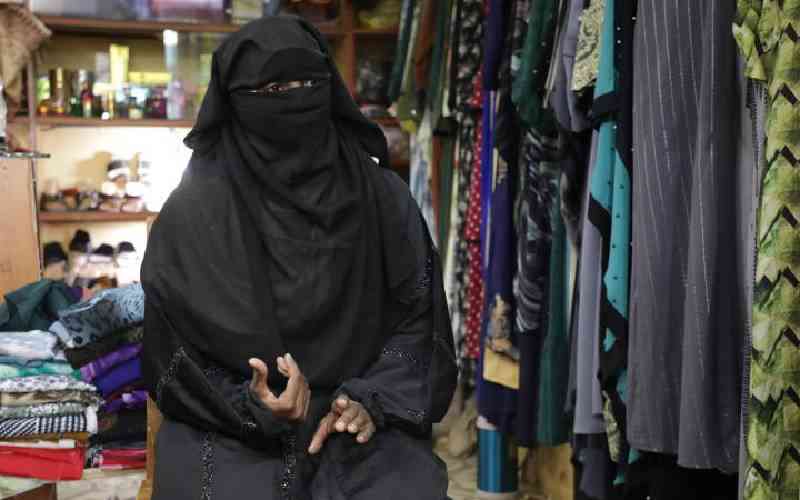
Mary was barely seven years old when she was subjected to Female Genital Mutation (FGM). "It was very painful. I was afraid and I thought I would die," she recalls.
Now, seven years later, the Form Two student in Marsabit town is traumatised with the experience still fresh in her mind. "If I were in a position to make a decision, I wouldn't have been cut," she says.
Her mother isn't any better off.
''The act torments me to date," she says. "It pained me to watch my daughter cut and bleed, but I had no control over the decision. None of my other daughters will be cut,'' she says. ''I do not want to subject them to infections, bleeding and difficult child bearing. The pain is adverse!"
Mary's case mirrors the pain thousands of girls and women are subjected to, even as Kenya joins the globe today to celebrate the International Day of Zero Tolerance for FGM.
Globally, at least 4.3 million girls are at the risk of FGM, according to the latest United Nations Population Fund (UNFPA).
The number is projected to reach 4.6 million by 2030, as conflict, climate change, rising poverty and inequality continue to hinder efforts to transform gender and social norms.
In Kenya, the prevalence of FGM stands at 15 percent, according to 2022 Kenya Demographic Health Survey (KDHS) report.
However, the vice remains high in Northern parts of the country, and among the Somali, Samburu, Abagusi and Maasai, with at least eight out of 10 girls mutilated.
Experts have attributed increased numbers to the adverse effects of climate change.
Out of 22 counties with high cases of FGM, at least 12 are experiencing the worst drought in several years.
Jackson Onyando, Child Protection Specialist in charge of FGM and Harmful Practices, UNICEF Kenya says the ravaging drought witnessed in the county has increased the vulnerability of girls and women.
Whereas UNICEF, government and other partners give cash transfers in support to communities to caution them from the shocks of climate change, some communities still view the girl as a 'safety net'
"Some girls are married off to replenish their family stock that has been swept by the drought," Onyando said.
The Standard team witnessed the dire situation that has put hundreds of locals on the brink of starvation. Camels, goats, sheep and cows are dying by hundreds, leaving pastoralists with nothing to survive on.
At the Marsabit Airstrip, a number of stock die in the grazing field that has been left bare, while those surviving the harsh condition are can fetch very little in the market. Dozens of livestock carcasses lie on the surface with some buried in silt affirmation of intolerable drought.
The price of a goat has drastically dropped from Sh6,000 to Sh300, whereas a mature cow sells at Sh1,000 from between Sh60,000 and Sh100,000.
Jeremy Ledaany, Tourism, Culture Gender and Social Services executive in Marsabit says the adverse effects of the drought have also interrupted the school feeding programme.
"Currently, households are vulnerable, they cannot afford food, and school fees for their children - the same children they can easily exchange for bride price," notes Ledaany.
Schools have been affected in enrolment with Milima Mitatu Primary School in Marsabit Central, only 148 learners have reported back to school.
Out of the 22 learners who sat for their Grade 6 national examinations, only seven have transitioned to Junior Secondary School, among them, only one girl.
The school headteacher Lucy Abalem said it is feared that a number of girls risks dropping out of school, undergoing the cut, and opting for early marriages.
"School is a safe haven for learners, but I do not know the whereabouts of those who have not reported. I fear that if we do not follow the learners, they will never live to attain a productive life," Abalem said.
Abalem added, "The drought is so devastating. With such, I fear we might have more girls forced to undergo the cut, and married off, in exchange for food."
Apart from drought, culture is also a hitch in the fight against FGM, as it is practised as a rite of passage.
Ledaany observes that communities residing in Marsabit have a cultural attachment to the vice, whose custodians are elders.
For example, Rendille and Gabra are among communities that encourage FGM, in preparation for early marriage.
Girls as young as 12 years from the two communities are cut and married in a hyped ceremony conducted twice in a year.
The cultural attachment has also made it difficult for politicians to denounce the vice, due to fear of repercussion.
"To wake up one day to break the culture is not going to be a walk in the park. It is a gradual process that people need more uptake of the formation," says the gender executive.
Traditionally, it is believed that women who have not undergone the cut have high sexual desires.
"I have been accused of promoting prostitution, and warned of fighting our culture. But this will not stop me from fighting to end the act," says Nuria Golo, the CEO, Marsabit Women Advocacy and Development Organisation (Mwado).
Mwado is among organisations that are working in partnership with UNICEF to fight FGM, by sensitising locals on the negative effects of the vice.
The sensitisation is conducted at community level, schools, churches and mosques.
According to World Health Organisation (WHO), FGM has no health benefits for girls and women.
The practise causes severe bleeding and problems urinating, and later cysts, infections, as well as complications in childbirth and increased risk of newborn deaths.
 The Standard Group Plc is a multi-media organization with investments in media platforms spanning newspaper print
operations, television, radio broadcasting, digital and online services. The Standard Group is recognized as a
leading multi-media house in Kenya with a key influence in matters of national and international interest.
The Standard Group Plc is a multi-media organization with investments in media platforms spanning newspaper print
operations, television, radio broadcasting, digital and online services. The Standard Group is recognized as a
leading multi-media house in Kenya with a key influence in matters of national and international interest.

